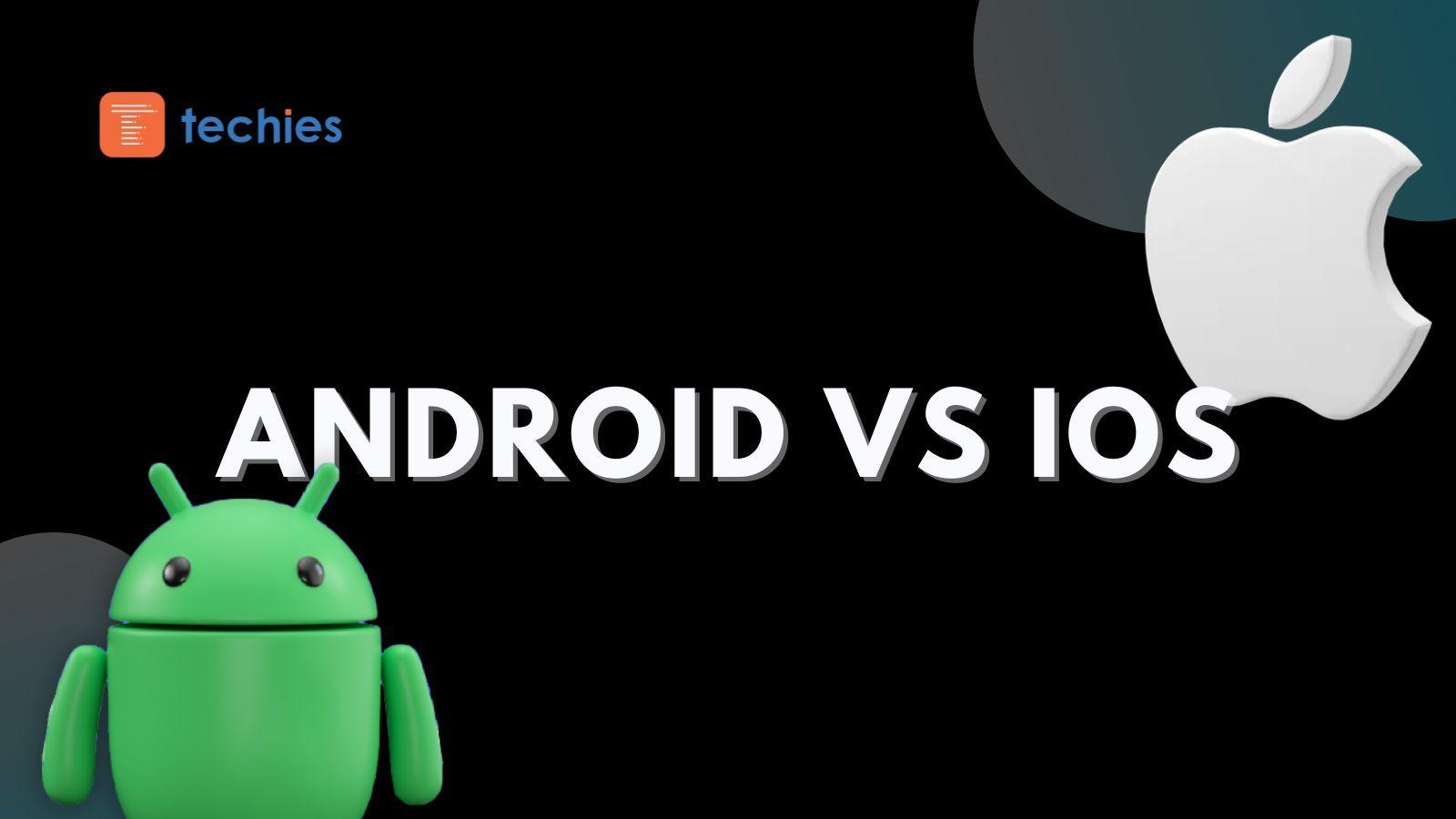Android vs iOS Development: A Comprehensive Comparison

In the ever-evolving landscape of mobile app development, selecting the right platform is a mission-critical decision that may significantly impact the success of one's business.
Android and iOS stand out as the dominant players in the mobile ecosystem— each with its own unique strengths and characteristics.
In this comprehensive comparison piece, we will delve into various aspects of Android and iOS development to assist entrepreneurs, business owners, and decision-makers in making an informed choice.
Android vs iOS market share
Before delving into the technicalities, let's first examine the current market share statistics for Android and iOS.
As of the latest Statista data, Android maintains a global market share lead, owing to its widespread international adoption by diverse device manufacturers.
By the same token, according to StatCounter, as of October 2023, Android global market share is around 69.64%. iOS trails behind with 29.67%. It is essential to note, however, that these numbers may vary regionally.
In fact, understanding the demographic differences between Android and iOS users is crucial for tailoring your app to the right audience.
For example, Android users often span a more diverse economic background and geographic locations. On the other hand, iOS users tend to be concentrated in more economically developed regions.
iOS devices are more prevalent in North America and Europe, while Android dominates in Asia, Africa, and South America. These distinctions underscore the importance of aligning your app development strategy with the target audience.
Android development environment
Generally, the Android development environment centres around Android Studio, the official integrated development environment (IDE) for Android app development. Programmers can choose between Java or Kotlin as the primary programming language.
The open nature of the Android platform provides developers with extensive flexibility and customisation options. Android Studio, with its robust set of tools and features, facilitates efficient development, testing, and debugging processes.
The Android Emulator allows developers to simulate various devices, aiding in the creation of responsive and adaptive apps for the diverse Android ecosystem.
Moreover, the availability of a heterogeneous range of libraries and frameworks simplifies the development of feature-rich applications.
iOS development environment
In the iOS development realm, Xcode serves as the primary IDE, supporting two programming languages: Swift and Objective-C.
For the most part, Apple's closed ecosystem offers a more streamlined and controlled development process— ensuring a standardised user experience across all iOS devices.
In fact, Xcode provides a comprehensive set of tools, including Interface Builder for designing user interfaces and the XCTest framework for testing.
On the other hand, the Swift programming language, introduced by Apple, has gained popularity for its readability and performance.
However, Objective-C remains a viable option for developers working on legacy projects or those with a background in C-based languages.
Differences between Android and iOS development
Android and iOS operating systems maintain a number of facets that set them apart and may influence the decision-making of any business owner. For example:
1. Design philosophy and user experience
When it comes to design philosophy, Android principally adheres to Material Design principles, emphasising a clean and intuitive interface.
In practice, material design focuses on a visually appealing and consistent user experience— incorporating principles like elevation, depth, and vibrant colours.
On the contrary, iOS follows Human Interface Guidelines, focusing on simplicity and consistency. iOS design principles prioritise clarity, depth, and deference, providing users with an intuitive experience.
So, the choice between the two depends for any business owner or developer will largely depend on their brand identity and the user experience they wish to deliver.
2. Android vs iOS app development cost and time
The cost and time involved in developing an app for Android or iOS hinge on various factors. For example, Android development may incur higher expenses due to the need to accommodate diverse screen sizes and devices.
Furthermore, developers typically need to account for the fragmentation within the Android ecosystem.
This may demand careful consideration of factors such as different screen resolutions, aspect ratios, and hardware capabilities.
Conversely, iOS development tends to be more time-efficient, given the limited device variations.
Apple's closed ecosystem, with a controlled number of devices, streamlines the testing and optimisation process. However, it's crucial to consider the potentially longer app review times associated with the Apple App Store.
So, consider the complexity of your app, your target audience, and the required features to make an informed decision. Factors such as the choice of development tools, third-party integrations, and the need for custom animations may influence both development time and cost.
3. Monetisation strategies for Android and iOS apps
Monetisation strategies play a pivotal role in app profitability. Android apps commonly leverage in-app advertisements, freemium models, and in-app purchases.
The Google Play Store allows developers to experiment with various pricing models, making it easier to reach a broader audience.
On the other hand, iOS apps often generate revenue through upfront app purchases and in-app purchases. Furthermore, the App Store is known for having a user base that is more willing to pay for high-quality apps.
Overall, consider the nature of your app, target audience, and revenue goals when selecting a monetisation strategy. Additionally, understanding the average revenue per user (ARPU) on each platform is crucial for devising a successful monetisation strategy that aligns with one’s business goals.
4. App store submission and approval process for Android vs iOS apps
Submitting an app to the Google Play Store and Apple App Store involves distinct processes, each with its own set of guidelines and considerations.
Google Play Store
The Google Play Store typically offers a quicker approval timeline. Developers can publish their apps without undergoing a stringent review process. However, this openness comes with the responsibility to adhere to Google's policies and guidelines, as violations may lead to app removal.
Apple App Store
The Apple App Store, known for its commitment to quality and user experience, maintains a more stringent review process.
While this can result in a higher standard of apps available to users, it also means a longer review time. So, developers need to ensure their apps comply with Apple's guidelines, covering aspects like functionality, design, and content.
Factor in your launch timeline and desired market penetration when deciding between the two. If a quick release is essential, the Google Play Store might be more accommodating.
However, if you prioritise a curated and high-quality user experience, the Apple App Store may be the preferred choice.
5. Maintenance and update requirements for Android and iOS apps
Post-launch maintenance and updates are inevitable for sustaining app relevance. Android apps may require more frequent updates due to the diversity of devices and operating system versions.
Developers need to ensure compatibility across various screen sizes, resolutions, and Android versions.
In contrast, iOS apps benefit from a more uniform environment, as Apple controls both the hardware and software. This results in a streamlined update process, allowing developers to focus on optimising their apps for the latest iOS version and a limited set of devices.
So, assess your resources and long-term commitment to ensure consistent app performance and user satisfaction. Also, consider factors such as the frequency of OS updates, user feedback, and emerging technologies to plan an effective maintenance strategy.
6. Security and privacy of Android vs iOS apps
Security is paramount in the mobile app landscape, given the increasing concerns about data breaches and privacy violations. Android and iOS adopt different approaches to user data and privacy.
Android
Android's open nature allows for more customisation but introduces potential security challenges. Google employs various security measures, such as the Google Play Protect service, which scans apps for malware. However, the diverse ecosystem can make it challenging to enforce consistent security standards across all devices.
iOS
iOS, with its closed ecosystem, has earned a reputation for robust security measures.
The App Store's strict review process helps maintain a higher level of security by filtering out potentially harmful apps. Additionally, features like App Transport Security (ATS) and Face ID contribute to enhancing user privacy and data protection.
So, carefully consider the nature of your app and the sensitivity of user data to align with platform-specific security standards. If your app involves handling sensitive information, iOS may provide a more secure environment.
Android vs. iOS development: Which is easier?
The question of whether Android or iOS development is easier lacks a one-size-fits-all answer. It depends on factors such as your team's expertise, project requirements, and the desired user experience.
Android
Android provides more flexibility and customisation options, making it suitable for developers with a preference for open platforms.
The availability of a wide range of devices and screen sizes can be both an advantage and a challenge.
For example, developers need to thoroughly test their apps across different devices to ensure a consistent user experience.
iOS
iOS offers a more controlled and streamlined development process. Additionally, the limited number of devices simplifies testing and optimisation. However, this controlled environment may limit customisation options, and developers need to adhere strictly to Apple's guidelines.
Overall, evaluate your priorities and resources to determine the platform that aligns with your development goals. If you prioritise customisation and a diverse market reach, Android might be the preferred choice.
On the other hand, if you seek a more controlled and standardised development environment, iOS may be the way to go.
Conclusion
All things considered, in the Android vs. iOS development debate, there is no definitive winner. Opinions will always be subjective. Ultimately, one’s choice between the two boils down to their business objectives, target audience, and development preferences.
Android's openness and broad market reach may appeal to some, while others may value the streamlined and controlled ecosystem of iOS.
By carefully considering the factors shared in this detailed comparison, any business can make an informed decision that lays the foundation for a successful mobile app venture— whether they prioritise market reach, development flexibility, or a curated user experience.
Explore our mobile app development services at Techies and don't hesitate to leave your contact information here.
About Author
Kok Weng
Kok Weng Kong is a tech enthusiast and problem-solving expert with a passion for technology and innovation. As the Founder & CEO of Techies App Technologies Sdn. Bhd., he specializes in building beautiful web and mobile applications and providing branding and marketing solutions for businesses. With a background in Information Technology and extensive experience in the industry, Kok Weng Kong excels in creating innovative solutions for various tech challenges.

Digitizing businesses since 2017
© 2026 Techies | All rights reserved


